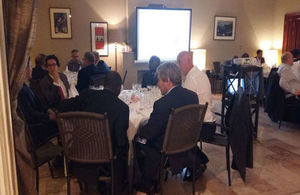British meat exporters explore the Congolese market
Ten British companies, members of EBLEX, a British organisation responsible for promoting British meat exports, visited Kinshasa

EBLEX delegates at a working dinner in Kinshasa
Ten British companies, members of EBLEX, a British organisation responsible for promoting British meat exports visited Kinshasa from 29 September to 1 October 2015 on a trade mission. The main objective of this visit was to meet meat importers and distributors operating in the DR Congo and to improve links between the Congolese and British markets.
On this occasion, Graham Zebedee, British Ambassador to DR Congo, hosted a working dinner on Wednesday 30 September at the British Ambassador’s residence. The event gathered EBLEX delegates, representatives of local meat importers and number of other companies operating in the DRC as well as experts from government entities working on business climate improvement and investment promotion, namely the “Collège Climat des Affaires” from the Prime minister’s office, “Comité de Pilotage pour l’Amélioration du Climat des Affaires et des Investissements (CPCAI)” and “Agence Nationale pour la Promotion des Investissements (ANAPI)”.
Congolese experts delivered a presentation on the government’s reforms aimed at improving the business environment and attracting local and foreign investments. Robert Hale, head of the Department for International Development (DFID) Economic Development Team, made a presentation on the priorities for their programme. During the event, participants’ discussions revolved around business opportunities and challenges in the DRC.
At the end of their mission in DR Congo, EBLEX delegates declared that they were pleased with the opportunity they were offered to better understand the country, a market of over 70 million consumers. Jean-Pierre Garnier, Head of EBLEX Export admitted that there is strong competition in the DRC market. He was nevertheless confident that, because of their comparative advantages, in terms of e.g. high standards in production and supply chain, British meats should be able to gain a significant share of the Congolese market.